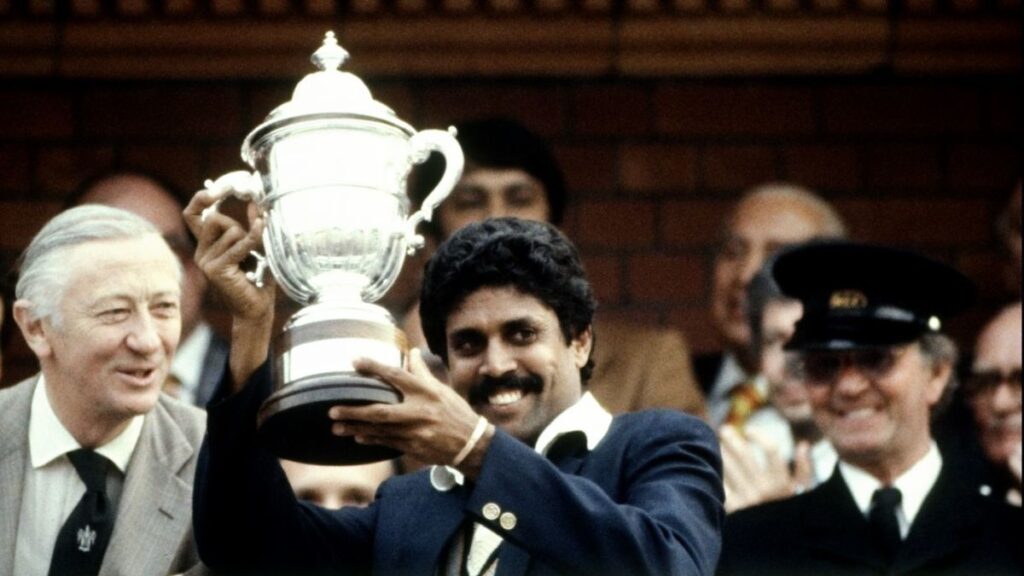For years now, sociologists and journalists have been engaged by the question: What is it that makes cricket such a passion with Indians, whether the team wins or not? And there is not any one answer that anyone has arrived at. However, cricket is one activity that keeps the nation engaged, perhaps as much as Bollywood.
Yet, unlike the movies, people tend to attach more importance to sport since the team is competing against other nations. And the cricket team does deliver some victories that raise the collective mood of the people. Cricket made a strong impact on Indians only because the national team started winning.
The 1983 Prudential World Cup was the first global contest featuring an Indian team that was watched live by audiences back home. It filled a vacuum, considering that India’s previous major success on field was the Hockey gold at the boycott-affected Olympic Games in Moscow in 1980. That it came in the wake of the onset of colour television in India in 1982 was also significant.
Indeed, it changed the landscape of sport in India, touching many lives joyously, ushering in a semblance of professionalism in Indian cricket, and making the sport’s administrators believe that they had a product that they could monetise. Above all, it instilled self-belief in practitioners across all sport.
Of course, cricket was popular from the very early days and grew in popularity after the Indian team secured its maiden Test series victories over West Indies and England in 1971. The fact that the squad of 1974, which lost 0-3 in England, was a public target is an indication that cricket had already assumed increasing importance in the collective psyche of the Indian people.
The resumption of cricketing ties with Pakistan in 1978 – and it becoming the first series to be aired by Doordarshan – was another milestone in the fans’ love affair with Indian cricket that cannot be ignored. Yet, it was the World Cup conquest in 1983, barely a year after India ushered in colour TV, that brought about a huge rise in the number of people who followed the game.
Also Read: Remembering Yashpal Sharma – Warrior Whose 89 Sparked World Cup Glory Run
I recall a conversation with Kapil Dev, captain of that Indian team, on the impact of that win. “I think when anything big like a World Cup win happens, change takes place,” he said. “It was a surprise and a happy occasion. People started believing that we can do it. Yes, 1983 was a first step forward and we started doing things well, though it took us time to win the title again.”
“Yet, I never thought cricket will come to such a stage where the film industry is scared to release a movie on Friday if there is a one-day game that day,” he added. “Honestly, I never imagined the game of cricket, let alone sports in our country, will change so much and at such a rapid pace.”
Kapil recognises the level to which later teams took India. “I believe change took place when Sourav Ganguly became captain and we started winning (overseas),” he said. “We had Sachin Tendulkar, Rahul Dravid, Anil Kumble, Harbhajan Singh, Virender Sehwag, VVS Laxman and Zaheer Khan – golden boys – all coming together and we started winning all around.
“From there onwards, we started believing. And the common person on the street started believing that we could beat anybody. When that takes place, you can say cricket has changed in our country. Indeed, it is a beautiful story.”
Kapil did not claim his team alone was responsible for change. “I think a lot of credit goes to the media which opened up slowly in our country,” he said. “Of course, change hastened with opening up our economy in the early ’90s under Prime Minister PV Narasimha Rao – we could carry plastic cards, go around, spend money and nobody was doubting what you were doing.
“If I look back, I will say the only change we brought about in Indian sport was the thought process. Nothing more. We are not ready to take a loss. We used to play not to lose. The earlier mindset was that while we can’t win, we should not lose. Our win changed that – we are not ready to take defeat. Not the talent, not the cricket, not the finesse. How to win a match.
“In our time, the thought uppermost in our minds was how to draw a series. Thoughts of winning a series were very rare. Today, we are looking to win a series. It is another matter that we don’t always succeed. The thought process has changed. That is the difference.”
He also said that he had never imagined how the 1983 win would change Indian sports. “Sports was a past-time – It used to be ‘by the way’ – but today, people make careers out of sports because our athletes in many sports have found international success,” he said. “I never thought sports will be that big.”
Truth be told, the World Cup win came 40 years ago – and four decades is a long time in anyone’s life – but there can be no denying that it was responsible for shaping the destiny of cricket in India and, perhaps, the world itself. And nobody would argue that the Class of 1983 also changed Indian sport at large, encouraging fans to bring their intensity and passion into play.
Also Read: How Kapil’s Legends and 1983 Changed my Life




